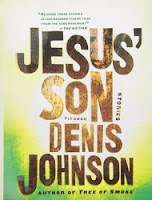 The episodes in Jesus' Son hang on degenerates, but the narrator's simple, intimate diction conveys a sense of peace rather than anxiety about or perverse fascination with the damaged scenery and people at issue. This collection of short stories by American author Denis Johnson is quite good. I learned of Jesus' Son by reading the essay, "Does Recovery Kill Great Writing?," published in The New York Times Magazine in March 2018. The essay includes this quote from Johnson's collection: “The sky was torn away and the angels were descending out of a brilliant blue summer, their huge faces streaked with light and full of pity.” I was intrigued. Then the essay's author reveals, "While I was studying at the Iowa Writers’ Workshop, I spent my nights at the writers’ bars on Market Street, and I spent my days reading the other writers who had gotten drunk in that town before I’d gotten drunk there: John Berryman, Raymond Carver, Denis Johnson." Having read this, when I picked up Jesus' Son, I expected Johnson's stories to boil up in America's less populated stretches of shadow and pain. Not so.
The episodes in Jesus' Son hang on degenerates, but the narrator's simple, intimate diction conveys a sense of peace rather than anxiety about or perverse fascination with the damaged scenery and people at issue. This collection of short stories by American author Denis Johnson is quite good. I learned of Jesus' Son by reading the essay, "Does Recovery Kill Great Writing?," published in The New York Times Magazine in March 2018. The essay includes this quote from Johnson's collection: “The sky was torn away and the angels were descending out of a brilliant blue summer, their huge faces streaked with light and full of pity.” I was intrigued. Then the essay's author reveals, "While I was studying at the Iowa Writers’ Workshop, I spent my nights at the writers’ bars on Market Street, and I spent my days reading the other writers who had gotten drunk in that town before I’d gotten drunk there: John Berryman, Raymond Carver, Denis Johnson." Having read this, when I picked up Jesus' Son, I expected Johnson's stories to boil up in America's less populated stretches of shadow and pain. Not so.My favorite stories include "Dundun," "Emergency," and "Dirty Wedding." In a scene in "Dirty Wedding," the narrator, having accompanied his girlfriend to the abortion clinic, is asked to wait outside the building among pro-life protestors. Johnson writes: "It was raining outdoors and most of the Catholics were squashed up under an awning next door with their signs held overhead against the weather. They splashed holy water on my cheek and on the back of my neck, and I didn't feel a thing. Not for many years."
